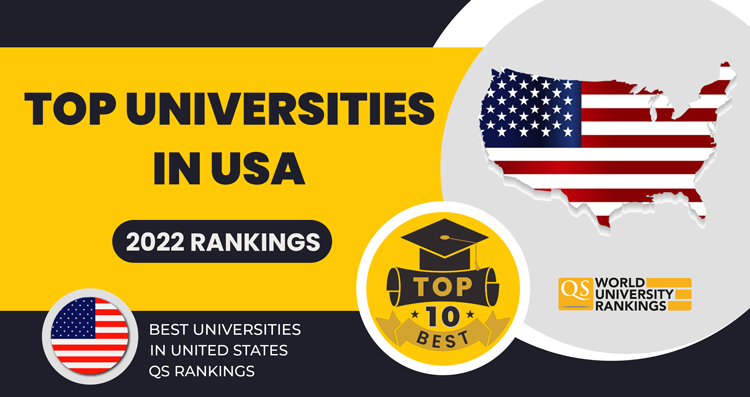
The question how to choose one the best universities in USA is indeed very difficult, But remember, choosing a university is an intensely personal decision.
But we will let you know the stats that will help you choose one the best universities in USA.
Let’s explore some of the best universities in the USA, providing a comprehensive view of their specialties, unique programs, and collaborative opportunities for students.
Massachusetts Institute of Technology (MIT)

As one of the most renowned institutions globally, MIT is often considered the premier destination for technology-focused education. The MIT School of Engineering and the School of Science host numerous ground-breaking research programs. MIT is also home to the renowned MIT Media Lab, an interdisciplinary research laboratory that explores the intersection of technology, multimedia, sciences, art, and design. The institute is also known for its robust entrepreneurial culture and offers various resources for students to launch their tech start-ups.
Stanford University

Nestled in the heart of Silicon Valley, Stanford has a strong connection to the tech industry. With cutting-edge research facilities and an entrepreneurial spirit, it’s no surprise that Stanford is a launchpad for numerous successful tech companies, including Google and Cisco. The university offers excellent programs through its School of Engineering and is home to the Stanford Computer Science department, one of the top computer science programs worldwide.
California Institute of Technology (Caltech)

With a strong emphasis on science and engineering, Caltech offers an exceptional student-to-faculty ratio, ensuring personalized attention for students. Caltech is also home to NASA’s Jet Propulsion Laboratory, where students have the opportunity to contribute to exciting space exploration initiatives. Their programs are rigorous and research-driven, allowing students to immerse themselves in technology advancements.
Carnegie Mellon University (CMU)
CMU is highly respected for its School of Computer Science and College of Engineering. The Pittsburgh-based institution is known for its programs in robotics, artificial intelligence, and software engineering. CMU’s distinctive interdisciplinary approach allows students to blend technical education with arts or social sciences, preparing them for a range of career paths.
University of California–Berkeley (UC Berkeley)
UC Berkeley is renowned for its College of Engineering and Computer Science programs. It has been a key player in significant technological advancements, including the development of the UNIX operating system. UC Berkeley’s proximity to Silicon Valley provides students with numerous internship and job opportunities, as well as potential engagement with venture capital for entrepreneurial initiatives.
Georgia Institute of Technology (Georgia Tech)
Georgia Tech offers top-tier tech programs, especially in engineering and computing. It’s known for its cooperative education program, where students alternate between classroom studies and full-time employment in their field of study, providing practical, hands-on experience.
University of Illinois–Urbana-Champaign (UIUC)
UIUC is a global leader in technology and engineering education. Its College of Engineering is particularly notable for its computer science and electrical engineering programs. The university’s Research Park provides a hub for technology commercialization, offering students ample opportunities for experiential learning and entrepreneurship.
What is the criteria to Choose Best Universities in USA?
Evaluating the best universities in USA isn’t solely about their academic prowess. Several factors should be considered to determine which universities excel overall. Here’s a comprehensive criterion to help evaluate the best universities in the USA.
1. Academic Excellence
The quality and rigor of the academic programs offered is a crucial criterion. This includes the breadth and depth of undergraduate and graduate degree programs, faculty qualifications, and the availability of diverse fields of study.
2. Research Opportunities
Leading universities are typically at the forefront of research in various fields. Look for universities that provide students with opportunities to engage in research, which can further deepen their understanding of their chosen field and enhance their practical skills.
3. Faculty Expertise
The qualifications and expertise of faculty members are essential. Top universities typically boast faculty who are leaders in their field, often contributing groundbreaking research and offering their unique insights to students.
4. Reputation and Ranking
Although rankings shouldn’t be the only factor considered, they can provide a general idea of a university’s standing in the academic community. This involves a combination of factors, including faculty awards, research output, and peer assessments.
5. Student-to-Faculty Ratio
A lower student-to-faculty ratio can often mean more personalized attention and mentorship opportunities for students. This can also affect class sizes and the availability of faculty for office hours.
6. Student Satisfaction and Outcomes
Metrics such as graduation rates, freshman retention rates, student satisfaction surveys, and post-graduation employment rates can offer insights into a university’s ability to support its students both during and after their studies.
7. Facilities and Resources
This includes the quality of libraries, laboratories, technology, study spaces, and other academic resources. The availability and quality of on-campus housing and dining can also affect a student’s university experience.
8. Campus Culture
This involves evaluating the social, cultural, and extracurricular experiences the university provides. Consider factors like clubs and organizations, sports teams, arts and cultural events, and volunteer opportunities.
9. Location and Surrounding Area
The university’s location may impact internship and job opportunities, cost of living, lifestyle, and even the subjects students choose to study. Proximity to industries related to one’s field of study can be beneficial.
Each student might weigh these factors differently according to their individual preferences, goals, and needs. The best university for a particular student is one that fits their unique academic, financial, and personal criteria.
You can check more interesting facts and trends here.


